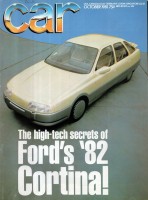Ford Fiesta Mk1
Model Introduction
The Mk1 Fiesta was launched in 1976 as Ford’s first front-wheel-drive supermini, designed to take on rivals like the Renault 5 and Fiat 127 in the growing European small car market. Known internally as Project Bobcat, it was developed by Ford of Europe with strong input from Ford’s American design chief Tom Tjaarda who shaped its compact, upright silhouette. The Mk1 featured a transverse engine, MacPherson strut front suspension, and a simple torsion beam rear axle, offering nimble handling, low running costs, and excellent packaging for its size. Its square-cut styling maximised cabin space, and the short, sharply cut-off rear gave it a clean, modern look that stood out from more rounded competitors.
Available at launch with 957cc and 1.1-litre Kent engines, the Fiesta quickly expanded to include a 1.3-litre Supersport and later the 1.6-litre XR2, which gave the lightweight shell serious hot hatch credentials. The XR2, introduced in 1981, featured a distinctive bodykit, round driving lamps, black plastic arch extensions, and ‘pepperpot’ alloy wheels, along with uprated suspension and a 0–60 time under 10 seconds, impressive for the era. The interior was spartan but well thought out with cloth seats, simple switchgear, and good all-round visibility. The Fiesta also benefited from modern production methods, being built at Ford’s new Valencia plant, and it quickly became a mainstay in Ford’s European lineup.
The Mk1 Fiesta was a major hit for Ford, combining sharp pricing, practical design, and easy driving characteristics in a way that resonated with first-time buyers, young families, and fleet operators alike. It sold over a million units in its first five years and laid the foundation for one of Ford’s most successful and enduring nameplates. While the base models were functional and frugal, the sporty XR2 helped build the Fiesta’s enthusiast following, a legacy that continued through until very recently. Now increasingly collectible, especially in Supersport and XR2 form, the Mk1 Fiesta stands as one of the defining small cars of the late 1970s and early 1980s.
Everybody loves the new kid in town
July 1977 – CAR Magazine
...but is the adoration really justified?
Down to earth fantasy
September 1979 – What Car?
Datsun Cherry Coupe v Ford Fiesta 1.1S v Toyota Starlet 1.2GL
Newcomers : Ford Fiesta X-Pack
July 1980 – CAR Magazine
How to make your Ford go faster. Henry Milton on the X-packs
Long Term Test : Happy Fiasco
October 1981 – CAR Magazine
If our 23,000 miles in a Ford Fiesta 1.3GL were happy ones from a driving point of view, they didn't excite the Ford dealers who had to keep it running nearly as much. Roomy, sensibly designed, comfortable and ever frugal, it had faults the servicemen never fixed. Mainly, it stopped a lot...
Housewives Choice
January 1982 – CCC Magazine
Graham Jones samples three mobile examples of some of the cheapest, most fiercely contested and easily prepared motor racing available - with a little help from British Saloon Car Champion, Win Percy
Newcomers : Spur for the Fiesta
February 1982 – CAR Magazine
Ford's XR version of the Fiesta looks the part but it's less racy than it could be and far from cheap
The Pretenders...
May 1982 – CCC Magazine
...to the open Golf tournament reviewed on page 48. Now that GM has finally screwed a 1600 engine into the excellent Kadett SR, and Ford's XR2 gets our vote as a more businesslike little machine than theXR3, we have, in theory, two more pretenders to the throne
Data Section
May 1983 – Autocar Magazine
Ford are continuing their special edition programme for 1983 by announcing the Fiesta Finesse. Based on the Fiesta Popular Plus, three engine sizes are available: 950, 1100, (1100 economy) and 1300 (the Fiesta Popular Plus models continue production in their standard form).
Standard equipment on Finesse models includes: tilting/removable sunroof, halogen headlamps, reversing lamps, remote control driver's door mirror and heated rear window -
equipment that is available only as an option at extra cost on the Popular Plus. Items standard on the Finesse, but not available on the Popular Plus models,
include a tailgate twistlock and 13in wheels with 155/70 tyres. Additional equipment inside the special edition includes reclining front seats, door bins and armrests, adjustable head restraints, four-spoke steering wheel,
electric screenwash and intermittent wipe, radio/stereo cassette player and cigar lighter. All other options available on the Popular Plus will be obtainable on Finesse models. Prices of the special editions are: 950 £4,612, 1100 £4,250 and 1300 £4,617












